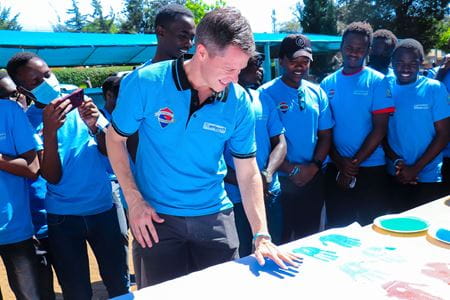Through the AMPATH partnership, faculty members from Indiana University School of Medicine’s division of infectious diseases work with colleagues in Kenya, including physician Charles Kwobah, MBChB, MMED; pharmacist Celia Ngetich, BPharm, Mclin Pharm; to improve antimicrobial stewardship at Moi Teaching and Referral Hospital (MTRH) and throughout western Kenya. The IU team includes Adrian Gardner, MD, MPH; Suzanne Goodrich, MD; Jack Schneider, MD; and Steven Hatch, MD, MSc.
Goodrich and Hatch reside most of the year in Kenya, and Gardner and Schneider make regular trips. Together, they support an interdisciplinary antimicrobial stewardship team composed of physicians including Drs. Shamim Ali and Irene Marete, as well as pharmacists and nurses at MTRH to implement a multi-faceted plan.
“Antimicrobial resistance (AMR) occurs when bacteria, viruses, fungi and parasites change over time and no longer respond to medicines,” said Gardner. “When antimicrobials become less effective, resistant organisms may spread, infections are harder to treat, and the risk of severe illness and death increases. In low- and middle-income areas, this threat can be exacerbated by conditions such as crowded hospitals and medical facilities and lack of access to clean water.”
AMR is one of the top global public health and development threats, and is driven by misuse and overuse of antibiotics, anti-virals, anti-fungals and anti-parasitics. “In many countries, including Kenya, these medications can be purchased in pharmacies without a prescription which drives high levels of use and misuse,” explained Dr. Kwobah.
The Government of Kenya published the first national action plan on containment of antimicrobial resistance in 2017; national guidelines for antimicrobial stewardship in 2020; and a handbook that set forth guidelines for using microbiological diagnostic tests in 2021.
“With the clinical microbiology laboratory at MTRH, the team developed MTRH’s first formal antibiogram,” said Goodrich. An antibiogram is a tool that can help clinicians make treatment decisions by providing a snapshot of resistance patterns for specific pathogens in different hospitals and communities. “Antibiograms can be useful for designing antibiotic regimens for both community-onset and hospital-acquired infections,” she added.
Program activities occurring through the AMPATH partnership at MTRH, county hospitals, health centers and in the community include:
- Enhanced clinical microbiology capacity including a new laboratory building, personnel and equipment, as well as increased training and support. The number of blood cultures performed between 2020 and 2022 doubled.
- Generate reliable microbiology data through training and hiring of additional phlebotomists, establishing new MTRH policy on the collection of blood cultures before antibiotics are administered and increasing needed supplies.
- Conduct facility needs assessment including interviews with staff members to characterize attitudes and practices toward antimicrobial use and testing the quality of antibiotic samples to detect substandard or counterfeit medicine.
- Implement appropriate antimicrobial education and stewardship activities including Infectious Disease Society of America trainings for interdisciplinary groups at MTRH, empiric antimicrobial treatment guideline development, community awareness events and trainings for hundreds of healthcare workers.
- Enhance capacity for infection prevention including establishing hand hygiene champions and new handwashing stations at all entry points.
“We have established an infectious disease consult service to assist with patient management and mentor clinical providers on appropriate use of antimicrobials. In the future, we plan to establish a formal infectious disease clinical fellowship program and develop a formal antimicrobial stewardship curriculum for county hospitals,” added Schneider.
“We still have a lot to do. We will build on what we have to continue to improve step-by-step,” concluded Ngetich, who recently received the 2024 International Scholarship Award from the Pediatrics Infectious Disease Society and also spent time at IU in Indianapolis where she participated in hospital rounds with the adult and pediatric stewardship teams and also presented to IU clinicians on the growing threat of AMR and the importance of global partnerships to help mitigate its effects.
